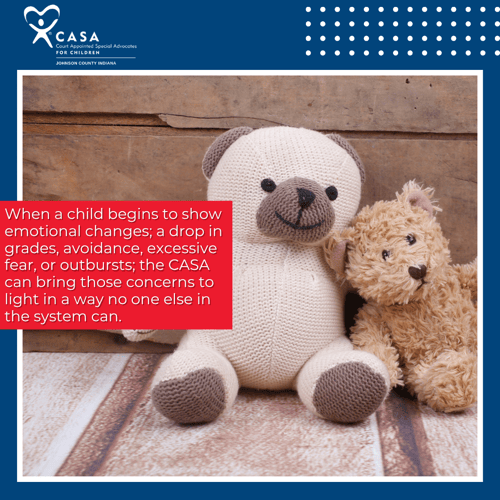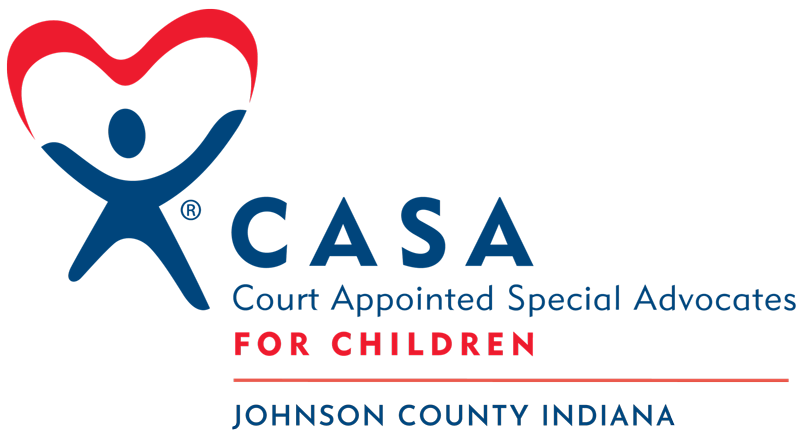How CASA Volunteers Support Mental Health Awareness for Children
October 31, 2025 •Johnson County CASA
.png?height=630&name=Featured%20Images%20%20(9).png)
Every child deserves to be safe, heard, and emotionally supported; especially those who have experienced abuse or neglect. At CASA of Johnson County, we understand that advocating for a child means more than speaking in court. It means standing beside them through some of the most vulnerable, confusing, and painful moments of their young lives. One of the most powerful, often unseen ways CASA volunteers make an impact is by supporting children's mental health.
The Hidden Trauma Behind the Case File
Children in the child welfare system often carry invisible wounds. They may have been removed from unsafe environments, separated from siblings, or witnessed violence or substance abuse. These experiences don’t just disappear. They can manifest as anxiety, depression, difficulty in school, behavioral issues, or emotional withdrawal.
A CASA volunteer becomes a steady, trusted adult in the midst of this storm. They are often the first to notice signs of emotional distress and the first to raise the flag for further help.
More Than Advocacy: A Bridge to Healing
CASA volunteers aren't therapists, and they don't offer clinical diagnoses. But they observe, listen, document, and act. When a child begins to show emotional changes; a drop in grades, avoidance, excessive fear, or outbursts; the CASA can bring those concerns to light in a way no one else in the system can.
Through consistent visits and careful relationship-building, CASA volunteers:
- Identify behavioral patterns that may point to deeper trauma
- Recommend mental health evaluations when appropriate
- Ensure the child’s voice is heard in court proceedings regarding their emotional needs
- Follow up on therapy plans or mental health services put in place
If needed, they work with the Department of Child Services (DCS) or case managers to seek community-based mental health resources. But in many cases, it is the CASA who continues to check in, advocate for follow-through, and provide emotional encouragement long after others move on.
Learn more about who we serve and why CASA support is so critical for a child’s well-being.
A Safe, Consistent Presence
For a child healing from trauma, consistency is a form of safety. With caseworkers changing, placements shifting, and court dates looming, CASA volunteers offer the one thing children in the system rarely have: someone who stays.
CASAs visit regularly in person, in safe, neutral places like schools, libraries, or visitation centers. These consistent, public check-ins offer not only safety but also stability and trust. Children begin to open up, and that's when real insight begins.
Building a Team Around the Child
When mental health concerns arise, CASA volunteers become connectors. They work closely with foster families, teachers, caseworkers, and therapists (when involved) to create a web of support for the child.
Sometimes, a CASA may advocate for a trauma-informed therapist. Other times, they may request that a judge order a psychological evaluation or ask for school-based support like an IEP. Because CASAs are court-appointed, their voices carry weight in legal decisions.
They aren’t just advocating for services, they are advocating for healing.
Find out how our volunteers are trained to handle difficult situations with compassion and clarity.
Compassion-Fueled, Community-Supported
At CASA of Johnson County, we understand the emotional toll this work can take, on children and volunteers alike. That’s why no CASA walks alone. Every advocate is backed by professional staff, coordinators, and a network of like-minded community members.
A Few Hours a Month. A Lifetime of Change.
Supporting a child’s mental health isn’t about having a degree in psychology, it’s about being a compassionate, consistent adult who sees the child, listens, and stands up for their emotional well-being in every report, meeting, and courtroom appearance.
Does volunteering really make a difference? The answer is yes. And you can be part of that change.
Ready to Be the Voice a Child Needs?
Your support can be the turning point in a child’s journey toward healing. Whether you're a teacher, a parent, a retiree, or simply someone who cares deeply, becoming a CASA volunteer means stepping up for a child's future.
Apply to become a CASA volunteer today and help guide a child to a brighter, healthier future.

